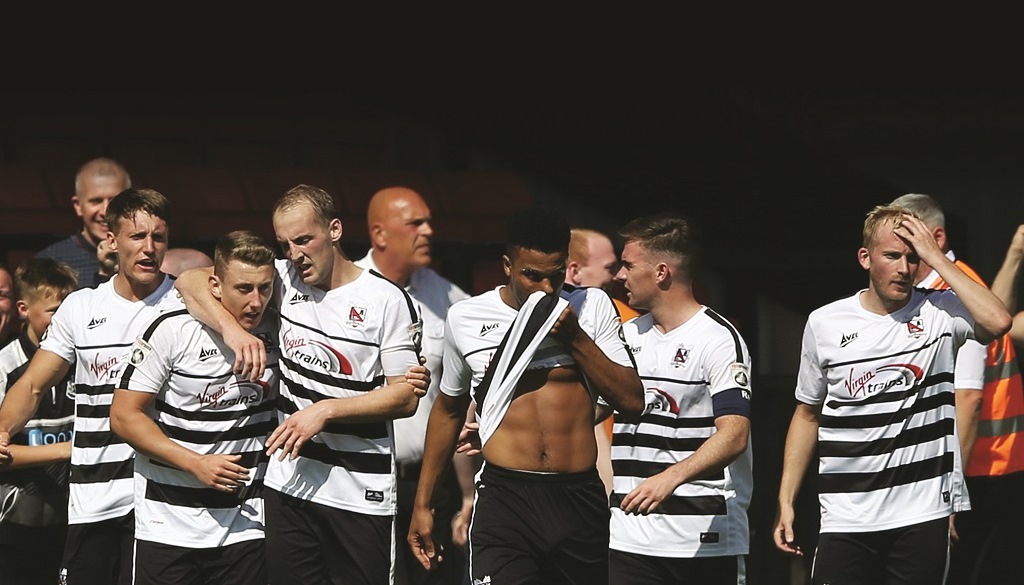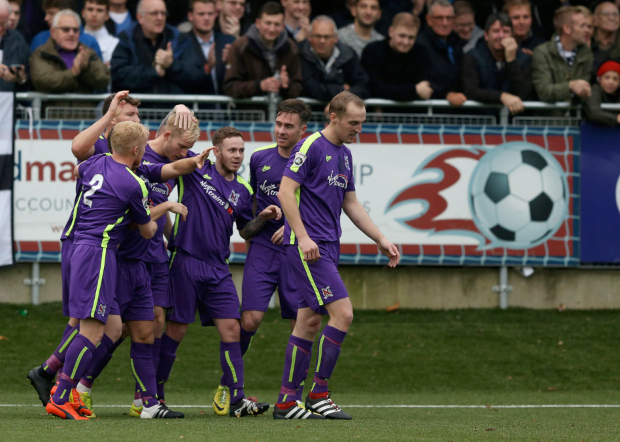
By David Preece
So, the season couldn’t have started any better for you. Not only have you come flying out of the starting blocks, but when you look behind you, you see someone has attached a rocket to your back and you’ve scored ten goals in the first three games and find yourself exactly where you want to be.
You begin to think you’re Hannibal from the A-Team, reclining in your office chair, lighting up a big cigar and appreciating how great it feels when your plan comes together.
You don’t admit it publicly, or stray from your poker game face that gives nothing away, but it’s only natural you begin to get ahead of yourself.
There’s an internal conflict. You fight against your natural instincts of self-preservation. You know that you should keep your head and not allow yourself to get carried away. Pride comes before a fall, after all.
But in those moments after the first win, then the second and especially the third, thoughts of what might potentially happen come the end of the season begin to enter your mind.
You draw the next game against a newly relegated big boy but ten points out of 12 is still on track.
Then you lose the next game at home and it’s a jolt to the system. You’ve been de-railed. You’re still in the mix but you’re still in a part of the season when dropped points can be more costly when it comes to league position.
Three points can cover ten places. It did this week. And although those teams in between winning is a highly unlikely event, that is the difference between the psychology of fighting for promotion or against relegation.
This is what has happened at my old club, Martin Gray’s Darlington – especially after their shock FA Cup defeat to South Shields at the weekend.
Of course the danger of either happening isn’t real yet, not after just nine or ten games, but the table is beginning to take shape and league position going into games becomes relevant both for how you see yourself and the opposition view you.
The points between clubs at either end of the table can be changed on its head with two or three wins, so its important to keep a sense of perspective. Once that first loss comes, the most important thing is not to panic or overreact and I can’t stress that enough. As a player, you can sometimes lose that perspective. It’s easily lost. You can fall into the trap of going into games feeling inferior to your opposition simply on the basis of league positioning.
And on the flip side of that, the team who are lying in a better position go into the game with a feeling of superiority and their chests puffed out that little bit further. When really, it’s not as simplistic as that. If you delve below the service and analyse things a little more deeply, that gap can become nominal but the table is where we take our main view.
It’s the easiest, most accessible way we can compare sides but the table isn’t always as truthful as we cliche-fully say it is. Perhaps at the end of the season, but not now.
If it wasn’t for the trigger-happy chairmen and the ridiculous pressure to find a winning formula in a matter of weeks, I wouldn’t bother looking at the table at all in those first six to eight weeks.
Okay, so it’s impossible not to, but what I’m trying to say is that sometimes you have to try and do things like that to take the emotion out of situations.
Losses and low league positions can cause people to react in such a way that clear thinking turns irrational. It was only later in my career that I began to try to flatline my emotions because becoming so reactionary was having an effect on my game.
Sure, it took some enjoyment away from my performances, but it stopped me from having these huge swings in mood and form.
When I see players and especially keepers reacting to conceding goals by kicking goalposts and shouting and screaming to each other, it just makes me think that for the the next five minutes they will be even more vulnerable to conceding again.
I know the players are disappointed and to some, it’s orchestrated sign to the fans to show how much they care, but they would be better served keeping their heads and exchanging words of encouragement with one another.
It’s something that we focused on in my later years at Aberdeen. After going behind, instead of the usual finger-pointing and recriminations. And it worked.
It took another form when I moved to Denmark. In one of my first games for Silkeborg, we were two goals down away to Esbjerg so early in the second half, I began pumping long balls up to our strikers.
I soon noticed an irate Viggo Jensen screaming at me from the sidelines.
But I thought I was doing the best thing by being more urgent with our approach. I was wrong. In the manager’s office the next day, he explained to me that no matter what the scoreline was at the time, that he wasn’t going to change this approach until he had to.
His reasoning? “If I wanted you to kick the ball long and play that way, I would tell you to do it from the first minute.” he explained. And I realised he was right.
The scoreline or the position in the table aren’t always fair reflections and shouldn’t always be allowed to affect your philosophy, especially when there is plenty of time to rectify the situation doing things the way you had planned and put so much hard work into.
There have already been departures across all the leagues and more under pressure after slow starts, but there has to be a more level-headed approach.
Frank de Boer’sacking by Crystal Palace last week after just four games is a sign that the game has grown too impatient and it needs to stop. Just keep calm and carry on.
*This article originally featured in The @NonLeaguePaper, which is available every Sunday!





















